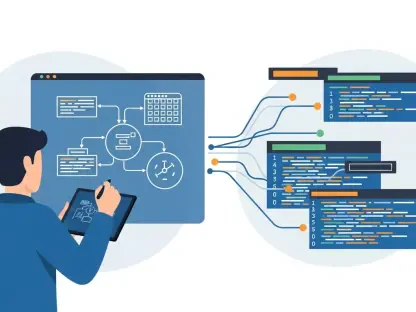In a world where digital transformation dictates competitive advantage, AI software services have emerged as a cornerstone for businesses striving to scale and innovate. Recent data reveals that global spending on AI solutions has surpassed $150 billion annually, with adoption rates accelerating across industries. This staggering investment underscores a pivotal shift: companies are no longer merely experimenting with AI but embedding it into core operations to drive efficiency and uncover new opportunities. The surge in AI-driven strategies signals a transformative era, raising critical questions about how these technologies redefine business models and customer interactions. This report delves into the dynamic landscape of AI software services, exploring their impact on growth, the challenges they present, and the future they promise.
Understanding the AI Software Services Landscape
The realm of AI software services stands at a defining moment, with rapid advancements positioning these tools as indispensable for modern enterprises. Their importance lies in the ability to streamline processes, enhance decision-making, and personalize offerings, thereby reshaping how companies operate in a digital-first environment. From multinational corporations to agile startups, the integration of AI has become synonymous with staying relevant amid fierce market competition.
Across sectors such as finance, healthcare, retail, and logistics, AI applications are diverse and impactful. In finance, fraud detection algorithms protect billions in transactions, while healthcare leverages AI for early disease diagnosis through pattern recognition in medical imaging. Retail businesses harness AI for inventory management and customer behavior analysis, and logistics firms optimize delivery routes to cut costs. This cross-industry adoption highlights AI’s versatility in addressing unique operational needs.
Key segments within AI services include automation, analytics, and personalization solutions, each contributing to efficiency gains. Automation reduces manual workloads through tools like robotic process automation, analytics uncovers actionable insights from vast datasets, and personalization tailors experiences to individual preferences. Major players like IBM, Microsoft, and Google dominate the market, driving innovation with cloud-based AI platforms. Meanwhile, ethical considerations and regulatory frameworks, such as data privacy laws, are shaping responsible deployment, ensuring that AI’s role in digital transformation aligns with societal values.
Market Trends and Growth Dynamics
Emerging Trends Shaping AI Adoption
The trajectory of AI software services is heavily influenced by cutting-edge developments in machine learning, natural language processing, and predictive analytics. These advancements enable systems to learn from data, understand human language with greater nuance, and forecast outcomes with remarkable accuracy. Such progress empowers businesses to anticipate market shifts and respond proactively, setting a new standard for operational agility.
Consumer expectations are also evolving, with a growing demand for personalized interactions pushing companies to adopt AI-driven solutions. This shift is fueled by the need for data-centric strategies that deliver tailored experiences, from customized product recommendations to individualized financial advice. Alongside this, market drivers such as cost reduction, enhanced efficiency, and the relentless pursuit of innovation are accelerating AI integration across diverse business functions.
Opportunities are emerging in unexpected areas, particularly for small and medium-sized enterprises (SMEs) and niche industries. Affordable AI tools, often accessible through subscription models, are democratizing access, allowing smaller players to compete with larger counterparts. Additionally, sectors like agriculture and education are beginning to explore AI for precision farming and adaptive learning platforms, signaling untapped potential for growth and specialization.
Market Performance and Future Projections
Current market data paints a robust picture of AI software services, with adoption rates climbing steadily as investment levels soar. Reports indicate that over 60% of enterprises have implemented at least one AI solution, with annual spending projected to grow at a compound rate of 25% from now through 2027. This financial commitment reflects confidence in AI’s capacity to deliver measurable outcomes across revenue and efficiency metrics.
Looking at performance indicators, businesses utilizing AI report significant returns on investment, often within the first year of implementation. Revenue growth in sectors adopting AI-driven analytics averages 15% higher than in non-adopters, while scalability successes are evident as systems handle expanding data loads without performance dips. These metrics underscore AI’s role as a catalyst for sustained business expansion.
Forward-looking analyses suggest that AI services will continue to evolve, driven by technological breakthroughs and shifting market demands. Integration with emerging fields like the Internet of Things (IoT) and 5G connectivity is expected to enhance real-time capabilities, while demand for specialized AI applications will likely spike. This evolution points to a future where AI becomes even more embedded in strategic planning and operational frameworks.
Challenges in Implementing AI Software Services
Adopting AI solutions is not without hurdles, as businesses grapple with substantial initial costs and complex integration processes. Deploying sophisticated AI systems often requires significant upfront investment in infrastructure and software, which can strain budgets, especially for smaller firms. Additionally, embedding these technologies into existing workflows poses technical challenges, requiring careful alignment to avoid disruptions.
Beyond financial and technical barriers, data quality issues and a shortage of skilled talent present ongoing obstacles. Inconsistent or incomplete datasets can undermine AI accuracy, leading to flawed outputs, while the scarcity of professionals trained in AI management limits effective deployment. Addressing these gaps demands strategic planning, including investments in data governance and specialized training programs.
Market-driven challenges, such as organizational resistance to change and competitive pressures, further complicate adoption. Employees may fear automation’s impact on roles, while rivals’ rapid AI advancements can create urgency to keep pace. Solutions like phased rollouts, partnerships with experienced AI vendors, and workforce upskilling can mitigate these issues. Ethical concerns, including algorithmic bias and potential job displacement, also warrant attention, necessitating transparent practices to maintain trust and balance progress with responsibility.
Regulatory Environment and Compliance in AI Services
Navigating the regulatory landscape for AI software services is increasingly critical as governments worldwide tighten oversight. Data privacy laws, such as the General Data Protection Regulation (GDPR) in Europe and the California Consumer Privacy Act (CCPA) in the United States, impose strict guidelines on how personal information is handled by AI systems. These regulations aim to protect users while challenging businesses to adapt their data practices accordingly.
Industry standards for ethical AI development are also taking shape, emphasizing fairness, accountability, and transparency in algorithmic decision-making. Compliance with these guidelines not only mitigates legal risks but also fosters consumer trust, a vital component of long-term sustainability. Companies adhering to such standards often gain a competitive edge by demonstrating commitment to responsible innovation.
Global variations in AI regulations create additional complexity for multinational entities. Differing rules across regions necessitate localized strategies to ensure compliance, impacting everything from data storage to user consent protocols. As regulatory frameworks evolve, their influence on business operations—particularly in data security and public reporting—will likely intensify, urging firms to prioritize adaptability in their AI strategies.
The Future of AI Software Services in Business
Envisioning the path ahead, AI software services are poised to be reshaped by innovations like generative AI and edge computing. Generative technologies are unlocking creative applications, from content creation to product design, while edge computing enhances processing speeds by decentralizing data analysis. These advancements signal a shift toward more autonomous and responsive AI systems.
Potential disruptors, including breakthroughs in AI ethics and quantum computing, could redefine the industry’s trajectory. Ethical frameworks that eliminate bias in algorithms may become standardized, while quantum capabilities could exponentially boost computational power for AI tasks. Alongside this, consumer preferences are trending toward seamless, hyper-personalized interactions, pushing businesses to refine AI for deeper engagement.
Growth areas such as AI in sustainability initiatives and underserved markets present exciting prospects. Applications in energy optimization and climate modeling are gaining traction, while regions with limited tech infrastructure are beginning to adopt AI for economic development. External factors, including global economic fluctuations and geopolitical dynamics, will also shape adoption rates, highlighting the need for resilient innovation ecosystems to support AI’s expansion.
Conclusion and Strategic Recommendations
Reflecting on the insights gathered, it is evident that AI software services have carved a transformative niche in business growth and innovation. The exploration of market trends, challenges, and regulatory impacts reveals a technology that is both a powerful enabler and a complex undertaking. The future potential, driven by emerging technologies and consumer demands, paints a landscape ripe with possibility.
Moving forward, businesses should prioritize strategic investments in AI to secure a competitive edge, focusing on scalable solutions that align with core objectives. Emphasizing ethical practices in development and deployment is crucial to building trust and ensuring compliance with evolving regulations. Partnering with specialized vendors can ease integration challenges, while fostering a culture of continuous learning will prepare workforces for an AI-driven era.
Ultimately, the journey ahead calls for a proactive stance—leveraging AI not just as a tool, but as a foundation for reimagining business models. By exploring untapped applications in sustainability and niche markets, companies can uncover fresh avenues for impact. The path to leadership in this space demands agility, foresight, and a commitment to balancing innovation with responsibility, ensuring that AI remains a force for sustainable advancement.









